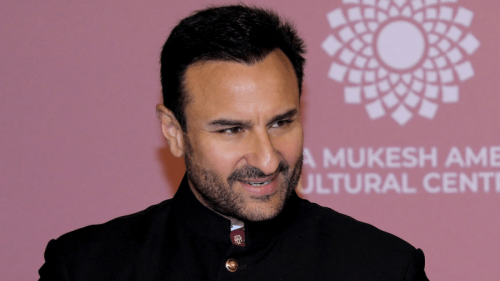LONDON: Winston Churchill’s finest hour may, yet again, be upon us. More than 50 years after he won the war and lost the election, Churchill is the man of the moment. On the night of September 11 his biography was on the bedside table of the then New York mayor, Rudolph Giuliani; now his bust sits on the Oval Office desk of George Bush. In May his name topped a BBC poll of the 100 greatest Britons. And last week, the televised portrayal of his prewar years, Gathering Storm, won three Emmys.
There is a certain irony in the timing of this transatlantic adulation. As Tony Blair and George Bush trot around the globe warning of the evils of chemical weapons, Churchill hardly stands out as a role model. As president of the air council in 1919, he wrote: “I do not understand the squeamishness about the use of gas. I am strongly in favour of using poisonous gas against uncivilized tribes.”
A few years later mustard gas was used against the Kurds. Nor did his distaste for the “uncivilized” stop there. He branded Gandhi “a half-naked fakir” who “ought to be laid, bound hand and foot, at the gates of Delhi and then trampled on by an enormous elephant with the new viceroy seated on its back”.
True, despite these flaws Churchill led his nation to victory in war. But then so did Stalin and it is unlikely Russians would put him at the top of their 100 greatest. That Churchill remains so revered tells us more about Britain than it does about him.
We live in a multiracial nation which champions a monoracial history. It puts Sir Henry Havelock, who led the massacre of thousands of Indians, in Trafalgar Square, and it shamelessly displays its colonial booty.
So as black history month begins (October) we should turn the tables. October is when black people relate the truth about our past so we might better understand the present and, it is hoped, navigate a better future. It aims to redress the imbalance in whose stories are told and how. Thirty-one days may be insufficient, but the purpose is important: it gives us the chance to hear narratives that have been forgotten, hidden, distorted or mislaid. It is time to ask whether white people would not benefit from doing the same for the other 11 months of the year. White people are in desperate need of becoming better acquainted with their own history.
The very notion of black and white history is, of course, both a theoretical nonsense and a practical necessity. There is no scientific or biological basis for race. It is a construct to explain the gruesome reality that racism built. So long as there is discrimination against races, we will also need to discriminate between them. Yet while blackness is relentlessly examined, whiteness is eternally presumed.
Black history is not a sub-genre of history. It is not an isolated part of the past with sole relevance to black people. Logic suggests, you cannot have black history without white history. There would be no Nelson Mandela, as we know him, without the architect of apartheid, Hendrik Verwoerd; nor would we have known of Rosa Parks had it not been for Mr Blake, the white driver who refused to let her sit at the front of the bus.
Nonetheless, given the imbalance of whose stories are told, the demand for white history months might appear odd. The trouble is not that we do not hear enough about white history, but that what masquerades as history is more akin to mythology. White people, like black people, need access to a past that is accurate, honest and inclusive. We do not need more white history; we need it better told.
The object here is not individual guilt - there are therapists for that - but collective responsibility. Slavery, colonialism and empire - propelled by economic expansion and justified by white supremacy - inform much of what Britain is today. The wealth they created funded everything from industry to commerce and roads to railways in Britain. The poverty they engendered contributed to everything from famine to war and disease to debt elsewhere.
To deny this is just one more version of white flight - a dash from the inconveniences bequeathed by inequality. “I am born with a past and to try to cut myself off from that past is to deform my present relationships,” writes Alasdair MacIntyre in his book, After Virtue. “The possession of an historical identity and the possession of a social identity coincide.” This is not just true of race but of gender, nationality and religion as well. Arguably, one of the principal beneficiaries of historical honesty would be the Irish.
So it does not mean that white history is racist history. A white history month would include many a progressive voice. Anti-slavery campaigner William Wilberforce, ANC militant Jo Slovo, and Rhaune Laslett, who was instrumental in organizing the Notting Hill Carnival, would be on the syllabus, as would the story of the Lancashire cotton workers in 1862, who supported the blockade of the southern states during the civil war to show their “detestation” at the attempt “to organize a nation having slavery as its basis”.
But in place of this reckoning we have a national psyche that is both selective in its memory and particular in its perspective. “When it comes to empire there are several types of ignorance,” says Katharine Prior, the historical adviser of the new British Empire and Commonwealth Museum opening in Bristol on October 25. “There are some who are not aware of the different dimensions of the history of colonialism and others who know only a version. It’s a mix of received opinions and vast gaps.”
The problem with these “gaps” is not only that they omit historical truths, but also that they distort current realities. The ignorance goes all the way to the top. Only this could explain a home secretary who calls on immigrants to speak the local language at home and integrate here when the British tradition was to do exactly the opposite in the empire. Or the Labour minister Jeff Rooker, who refers to asylum seekers as “young, single men who have deserted their families for money”, when he could just as easily be talking about the staff at the East India Company. The myopia reaches all over the world. Britain once ruled Palestine, Zimbabwe, India, Pakistan, Sri Lanka, Sudan and Iraq - to name but a few - where conflicts rage that are directly related to their colonial legacy. But to look at our foreign policy you wouldn’t know it.
Black Britons know it because we experienced it first hand. It is those white Britons who have either forgotten or never knew, or who prefer a version edited beyond both comprehension and credibility, who need to be taught. The first white history lesson would start with a quote from a prominent politician. “This small island [is] dependent for our daily bread on our trade and imperial connections. Cut this away and at least a third of our population must vanish speedily from the face of the earth.” His name? Winston Churchill.—Dawn/The Guardian News Service.
















































Dear visitor, the comments section is undergoing an overhaul and will return soon.